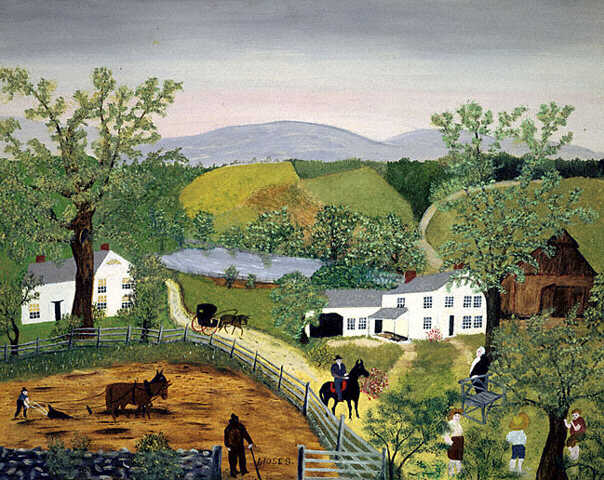 Our society doesn't usually associate aging with the emergence of abilities; rather, their decline. Many are familiar, however, with quite the opposite - colloquially known as later blooming - renowned American folk artist, Grandma Moses, one of the more memorable examples of new found talents later in life - a former embroiderer who turned to painting at age seventy-six. According to Late Bloomer, Anna Marie Robertson's first paintings went unnoticed at a county fair, though her raspberry jam sold well. Over the next three decades, she produced 1600 canvases.
Our society doesn't usually associate aging with the emergence of abilities; rather, their decline. Many are familiar, however, with quite the opposite - colloquially known as later blooming - renowned American folk artist, Grandma Moses, one of the more memorable examples of new found talents later in life - a former embroiderer who turned to painting at age seventy-six. According to Late Bloomer, Anna Marie Robertson's first paintings went unnoticed at a county fair, though her raspberry jam sold well. Over the next three decades, she produced 1600 canvases.A very nice article here in the Atlantic by Richard Senelick, M.D. who discusses how (what we consider) brain deterioration, in some respects, actually means the enabling or emergence of other abilities. Change, I think, is the operative term. Richard Senelick's article focuses on people who, say, become incredible artists or musicians with the onset of dementia and Alzheimer's, but implications abound for all of us in more "ordinary" stories of aging, for how any of us approach living at different stages in our development-- whether we see the proverbial glass half-full with promise, rather than half-empty. Circumstances aside (Grandma Moses herself simply said that she at last had the time to paint), many social messages suggest we see ourselves and others only in terms of the later, but this is not really the case. The brain organizes or maps information in different ways at different points over the course of a human being's life. A given combination of physiological and learned elements may produce abilities in one area during one period, with changes in those combinations producing other abilities at another phase.
The late educator and writer John Holt, in one of his lesser known books, Never Too Late: My Musical Life Story, wrote similarly on this subject when he decided to learn the cello in his forties. Never Too Late chronicles his own personal music journey later in life. From wiki: A 40-year-old's taking up an instrument, learning it, and playing it very well was something not really heard of at the time. [John Holt] explains that even though "there are still limits to what can be accomplished, they are farther away than we imagine."
*Painting above, The Pond, by Grandma Moses.
No comments:
Post a Comment